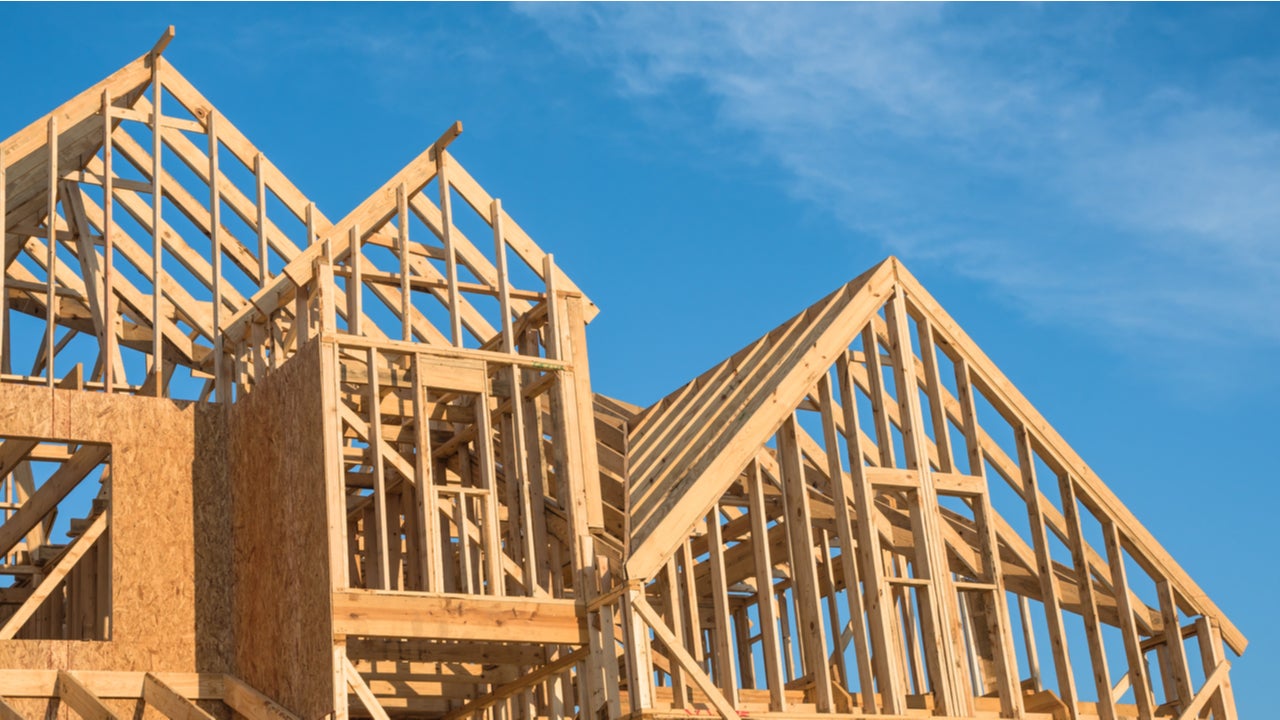Home>Finance>What Credit Score Do I Need For A Construction Loan


Finance
What Credit Score Do I Need For A Construction Loan
Published: October 21, 2023
Find out the necessary credit score for a construction loan in the finance industry. Explore the requirements and guidelines to secure financing for your construction project.
(Many of the links in this article redirect to a specific reviewed product. Your purchase of these products through affiliate links helps to generate commission for LiveWell, at no extra cost. Learn more)
Table of Contents
Introduction
When it comes to building your dream home, securing financing can be a crucial step in turning your vision into reality. Construction loans are designed specifically for funding the construction of a new home or major renovations. Unlike a traditional mortgage, these loans are typically short-term and require a different set of criteria for approval.
One essential factor that lenders consider when evaluating your eligibility for a construction loan is your credit score. Your credit score is a numerical representation of your creditworthiness and serves as a tool for lenders to assess the level of risk involved in lending to you. It reflects your financial responsibility and history of repaying debts.
In this article, we will explore the significance of credit scores in the context of construction loans and discuss the minimum credit score requirements. We will also delve into the factors that influence credit score requirements and provide practical steps to improve your credit score in order to increase your chances of securing a construction loan.
Understanding the role of credit scores in construction loans is paramount as it can impact the terms and conditions of your loan, including the interest rate, loan amount, and repayment period. By gaining insight into the credit score requirements and taking steps to improve your creditworthiness, you can position yourself to secure the financing you need to build your dream home.
Understanding Construction Loans
Construction loans are a type of financing specifically designed for individuals looking to build a new home or undertake significant renovations. Unlike traditional mortgages, construction loans are typically shorter in duration, ranging from six months to a few years, and require a different set of criteria for approval.
These loans are usually paid out in a series of progress payments, with funds being released as each phase of the construction project is completed. This ensures that the construction costs are covered as the project progresses, minimizing the risk for both the lender and the borrower.
Construction loans can be used for various purposes, including building a new home from scratch, adding an extension to an existing property, or even conducting major structural renovations. The funds obtained from the loan can cover the cost of materials, labor, permits, and any other expenses related to the construction process.
One important feature of construction loans is that they often have higher interest rates compared to traditional mortgages. This is because construction loans are considered riskier for lenders since the collateral (the property) does not yet exist at the time of loan approval. Additionally, the repayment period is shorter, resulting in higher monthly payments.
It is worth noting that there are two main types of construction loans: construction-to-permanent loans and stand-alone construction loans. Construction-to-permanent loans combine the financing for the construction phase and the home mortgage into a single loan. Stand-alone construction loans, on the other hand, only cover the construction phase and require a separate loan for the permanent mortgage.
Understanding the nuances of construction loans is vital for anyone considering building their own home or undertaking a major renovation. Knowing the ins and outs of this type of financing can help you navigate the loan process more effectively and make informed decisions about your construction project.
Importance of Credit Score in Construction Loans
Your credit score plays a crucial role in the approval process for construction loans. Lenders rely on credit scores as a measure of your creditworthiness and financial responsibility. A high credit score indicates that you are likely to repay your debts on time and in full, making you a lower risk borrower.
Construction loans, like any other type of loan, involve a significant amount of money and come with inherent risks for lenders. Your credit score helps lenders determine the level of risk associated with lending to you. A higher credit score demonstrates a history of responsible financial behavior and makes you a more attractive candidate for loan approval.
One of the key reasons why credit score is important in construction loans is that it directly affects the terms of the loan. A higher credit score can result in lower interest rates, allowing you to save money over the life of the loan. On the other hand, a lower credit score may lead to higher interest rates, increasing the overall cost of borrowing.
Additionally, lenders also consider your credit score when determining the loan amount and repayment terms. A higher credit score can improve your chances of being approved for a larger loan amount, giving you the financial flexibility needed to complete your construction project. It can also lead to more favorable repayment terms, such as a longer repayment period, which can make the loan more manageable for you.
Furthermore, a good credit score can instill confidence in lenders and provide reassurance that you are a reliable borrower. Lenders want to see a track record of responsible credit usage and a demonstrated ability to manage debt effectively. This can give them the confidence to provide you with the necessary funds to build your dream home.
Overall, having a good credit score is essential for securing a construction loan with favorable terms and conditions. It not only increases your chances of loan approval but also enables you to access higher loan amounts and better interest rates. By maintaining a strong credit score, you demonstrate your financial responsibility and increase your potential for successfully obtaining a construction loan.
Minimum Credit Score Requirements for Construction Loans
The minimum credit score requirements for construction loans vary depending on the lender and the specific loan program. In general, lenders look for a credit score of at least 620 to consider you for a construction loan. However, some lenders may require a higher score, such as 680 or above, for more stringent loan programs.
It’s important to note that meeting the minimum credit score requirement does not guarantee loan approval. Lenders consider various factors, such as your debt-to-income ratio, employment history, and the value of the property being constructed, in addition to your credit score.
Credit scores are typically categorized into different ranges, with each range reflecting a different level of creditworthiness. Here is a breakdown of credit score ranges and their implications for construction loan eligibility:
- Poor Credit (300-579): With a credit score in this range, it can be difficult to qualify for any type of loan, including construction loans. It’s highly recommended to work on improving your credit before applying for a construction loan.
- Fair Credit (580-669): While you may still be considered for a construction loan with a fair credit score, you may face higher interest rates and stricter criteria for loan approval.
- Good Credit (670-739): Falling into this range improves your chances of getting approved for a construction loan. You are likely to secure better interest rates and more flexible terms.
- Very Good Credit (740-799): A credit score in this range is considered excellent and greatly enhances your eligibility for a construction loan. Lenders will view you as a highly reliable borrower and may offer more favorable loan options.
- Exceptional Credit (800-850): This is the highest credit score range and puts you in an excellent position for securing a construction loan. Lenders are highly likely to approve your loan application and may offer the best interest rates and loan terms available.
It’s important to remember that credit scores are just one factor lenders consider when evaluating your application for a construction loan. While meeting the minimum credit score requirement is significant, other aspects such as your income, assets, and overall financial stability also play a role in the approval process.
Keep in mind that different lenders may have varying credit score requirements, so it’s essential to research and compare multiple lenders to find the one that matches your credit profile and construction loan needs.
Factors Affecting Credit Score Requirements for Construction Loans
While the minimum credit score requirement is an important factor in obtaining a construction loan, there are several other factors that lenders consider when determining your eligibility. Understanding these factors can provide insights into why credit score requirements may vary among lenders and loan programs.
Here are some key factors that can influence credit score requirements for construction loans:
- Loan Program: Different loan programs have varying credit score requirements. Some lenders offer more flexible loan programs with lower credit score requirements, while others may have stricter criteria for loan approval.
- Loan-to-Value Ratio (LTV): The LTV ratio represents the loan amount as a percentage of the appraised value of the property. Lenders often have stricter credit score requirements for higher LTV ratios, as a higher risk is associated with a larger loan amount relative to the property value.
- Debt-to-Income Ratio (DTI): Your DTI ratio is calculated by dividing your monthly debt payments by your gross monthly income. Lenders typically prefer borrowers with a lower DTI ratio, indicating a healthier financial situation. A lower DTI ratio may alleviate some credit score requirements, as it signifies a decreased risk of defaulting on loan payments.
- Down Payment Amount: The amount of down payment you can provide for a construction loan can also affect credit score requirements. A higher down payment reduces the loan-to-value ratio, decreasing the lender’s risk and potentially allowing more flexibility in credit score requirements.
- Income and Employment History: Lenders assess your income stability and employment history to gauge your ability to repay the loan. A strong and consistent employment history, along with a reliable income source, can compensate for a lower credit score and increase your chances of loan approval.
- Property Value and Collateral: The value of the property being constructed or renovated is an important consideration for lenders. A higher value property can offset some credit score requirements, as it provides additional security for the loan.
- Financial Reserves: Having sufficient financial reserves, such as savings or investments, can demonstrate your ability to handle unexpected expenses during the construction process. This can positively impact the lender’s assessment of your creditworthiness.
It’s important to note that these factors are not the sole determinants of credit score requirements, but rather influence the overall evaluation process. Lenders weigh multiple factors to assess the risk associated with lending to an individual for a construction loan.
Each lender may prioritize these factors differently, which is why credit score requirements can vary. To increase your chances of meeting credit score requirements, it’s essential to maintain financial stability, improve your credit score, and research lenders that align with your specific financial situation and construction loan needs.
Steps to Improve Your Credit Score for a Construction Loan
If your credit score is lower than the desired range for a construction loan, there are several steps you can take to improve your creditworthiness and increase your chances of loan approval. While improving your credit score takes time and effort, the long-term benefits are well worth it. Here are some key steps you can take to improve your credit score:
- Check Your Credit Report: Obtain a copy of your credit report from each of the three major credit bureaus (Equifax, Experian, and TransUnion) and review it for errors or discrepancies. If you identify any errors, dispute them to have them corrected, as this can potentially boost your credit score.
- Prioritize Timely Bill Payments: Consistently paying your bills on time is one of the most effective ways to improve your credit score. Set up reminders or automate payments to ensure you never miss a due date. Even a few late or missed payments can have a negative impact on your credit score.
- Reduce Credit Card Balances: Keeping your credit card balances low can positively affect your credit score. Aim to keep your credit card balances below 30% of your credit limit. Paying down your credit card debt can not only boost your credit score but also improve your debt-to-income ratio.
- Avoid Opening New Credit Accounts: While it may be tempting to open new credit accounts to improve your credit mix, it can temporarily lower your credit score. Limit opening new accounts, especially in the months leading up to your construction loan application.
- Minimize Credit Inquiries: Applying for new credit results in hard inquiries on your credit report, which can lower your credit score. Try to limit the number of credit inquiries during the construction loan application process.
- Keep Old Accounts Open: Closing old credit accounts can negatively impact your credit utilization ratio and average account age. Keeping old accounts open, even if they are not actively used, can help boost your credit score.
- Establish a Payment Plan: If you have delinquent accounts or collections, work out a payment plan with the creditors to resolve the outstanding debts. This can show responsible credit management and improve your credit score over time.
- Seek Professional Credit Counseling: If you are struggling to improve your credit score on your own, consider working with a reputable credit counseling agency. They can provide guidance and assistance in developing a personalized plan to improve your credit health.
Remember, improving your credit score is a gradual process. It takes time to see significant improvements. Be patient, stay disciplined, and consistently practice good credit habits to increase your creditworthiness for a construction loan.
By following these steps and actively managing your credit, you can enhance your chances of securing a construction loan with favorable terms and achieve your goal of building your dream home.
Conclusion
Securing a construction loan to build your dream home requires careful consideration of various factors, with your credit score playing a significant role in the approval process. Understanding the importance of credit scores in construction loans and the minimum credit score requirements can help you prepare and take steps to improve your creditworthiness.
Maintaining a good credit score not only increases your chances of loan approval but also opens up opportunities for better loan terms, such as lower interest rates and higher loan amounts. It is essential to review and understand your credit report, prioritize timely bill payments, reduce credit card balances, and avoid opening new credit accounts.
Other factors, such as your debt-to-income ratio, down payment amount, income stability, and property value, also influence credit score requirements for construction loans. It’s crucial to work on improving these aspects of your financial profile alongside your credit score to present a strong application to potential lenders.
While the journey to improving your credit score may take time and effort, the benefits are substantial. Not only will a higher credit score increase your chances of securing a construction loan, but it can also improve your overall financial well-being and provide opportunities for future borrowing needs.
Remember to stay proactive and dedicated to managing your credit responsibly. Regularly review your credit report, consistently make on-time payments, and practice good credit habits to maintain or elevate your credit score. If needed, seek professional guidance from credit counseling agencies to develop a personalized plan to improve your credit health.
By taking the necessary steps to improve your credit score and understanding the factors that influence credit score requirements, you can position yourself for success in obtaining a construction loan and turning your dream home vision into a reality.














